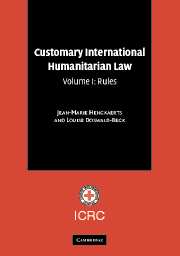Book contents
- Frontmatter
- Contents
- Foreword by ICRC President Jakob Kellenberger
- Foreword by Judge Abdul G. Koroma
- Foreword by Yves Sandoz
- Acknowledgements
- Introduction
- List of abbreviations
- Part I The Principle of Distinction
- Part II Specifically Protected Persons and Objects
- Part III Specific Methods of Warfare
- Part IV Weapons
- Chapter 20 General Principles on the Use of Weapons (Rules 70–71)
- Chapter 21 Poison (Rule 72)
- Chapter 22 Nuclear Weapons
- Chapter 23 Biological Weapons (Rule 73)
- Chapter 24 Chemical Weapons (Rules 74–76)
- Chapter 25 Expanding Bullets (Rule 77)
- Chapter 26 Exploding Bullets (Rule 78)
- Chapter 27 Weapons Primarily Injuring by Non-detectable Fragments (Rule 79)
- Chapter 28 Booby-traps (Rule 80)
- Chapter 29 Landmines (Rules 81–83)
- Chapter 30 Incendiary Weapons (Rules 84–85)
- Chapter 31 Blinding Laser Weapons (Rule 86)
- Part V Treatment of Civilians and Persons Hors De Combat
- Part VI Implementation
Chapter 24 - Chemical Weapons (Rules 74–76)
Published online by Cambridge University Press: 05 June 2012
- Frontmatter
- Contents
- Foreword by ICRC President Jakob Kellenberger
- Foreword by Judge Abdul G. Koroma
- Foreword by Yves Sandoz
- Acknowledgements
- Introduction
- List of abbreviations
- Part I The Principle of Distinction
- Part II Specifically Protected Persons and Objects
- Part III Specific Methods of Warfare
- Part IV Weapons
- Chapter 20 General Principles on the Use of Weapons (Rules 70–71)
- Chapter 21 Poison (Rule 72)
- Chapter 22 Nuclear Weapons
- Chapter 23 Biological Weapons (Rule 73)
- Chapter 24 Chemical Weapons (Rules 74–76)
- Chapter 25 Expanding Bullets (Rule 77)
- Chapter 26 Exploding Bullets (Rule 78)
- Chapter 27 Weapons Primarily Injuring by Non-detectable Fragments (Rule 79)
- Chapter 28 Booby-traps (Rule 80)
- Chapter 29 Landmines (Rules 81–83)
- Chapter 30 Incendiary Weapons (Rules 84–85)
- Chapter 31 Blinding Laser Weapons (Rule 86)
- Part V Treatment of Civilians and Persons Hors De Combat
- Part VI Implementation
Summary
Rule 74. The use of chemical weapons is prohibited.
Practice
Volume II, Chapter 24, Section A.
Summary
State practice establishes this rule as a norm of customary international law applicable in both international and non-international armed conflicts.
International armed conflicts
The use of chemical weapons is prohibited in international armed conflicts in a series of treaties, including the Hague Declaration concerning Asphyxiating Gases, the Geneva Gas Protocol, the Chemical Weapons Convention and the Statute of the International Criminal Court. At present, only 13 States are not party to either the Geneva Gas Protocol or the Chemical Weapons Convention. Of these, at least three have made statements to the effect that the use of chemical weapons is unlawful, or have indicated that they do not possess or use them or that they are committed to their elimination. The prohibition is also contained in a number of other instruments.
Numerous military manuals restate the prohibition of the use of chemical weapons. This prohibition is also contained in the legislation of many States. There are numerous statements and other practice by States from all parts of the world to the effect that the use of chemical weapons is prohibited under customary international law. Most allegations of use since the 1930s either are unsubstantiated or have been denied; the few confirmed cases have been widely denounced by other States. There is also national case-law to the effect that the use of chemical weapons is prohibited under customary international law.
- Type
- Chapter
- Information
- Customary International Humanitarian Law , pp. 259 - 267Publisher: Cambridge University PressPrint publication year: 2005
- 2
- Cited by



